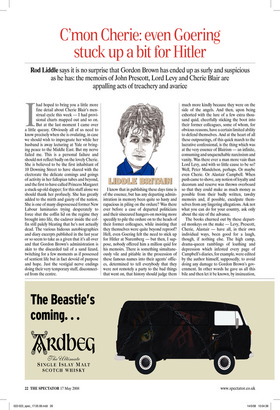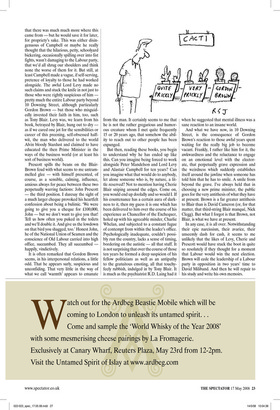stuck up a bit for Hitler
Rod Liddle says it is no surprise that Gordon Brown has ended up as surly and suspicious as he has: the memoirs of John Prescott, Lord Levy and Cherie Blair are appalling acts of treachery and avarice Ihad hoped to bring you a little more fine detail about Cherie Blair’s menstrual cycle this week — I had provisional charts mapped out and so on. But at the last moment I came over a little queasy. Obviously all of us need to know precisely when she is ovulating, in case we should wish to impregnate her while her husband is away lecturing at Yale or bringing peace to the Middle East. But my nerve failed me. This is a personal failure and should not reflect badly on the lovely Cherie. She is believed to be the first inhabitant of 10 Downing Street to have shared with the electorate the delicate comings and goings of activity in her fallopian tubes and beyond, and the first to have called Princess Margaret a stuck-up old slapper; for this stuff alone we should thank her profusely. She has greatly added to the mirth and gaiety of the nation. She is one of many dispossessed former New Labour luminaries trying desperately to force shut the coffin lid on the regime they brought into life, the cadaver inside the coffin still palely bleating that he’s not actually dead. The various hideous autobiographies and diary excerpts published in the last year or so seem to take as a given that it’s all over and that Gordon Brown’s administration is akin to the discarded tail of a sand lizard, twitching for a few moments as if possessed of sentient life but in fact devoid of purpose and hope. Just the vestigial nerve endings doing their very temporary stuff, disconnected from the centre. I know that in publishing these days time is of the essence, but has any departing administration in memory been quite so hasty and rapacious in piling on the ordure? Was there ever before a case of departed politicians and their sinecured hangers-on moving more speedily to pile the ordure on to the heads of their former colleagues, while insisting that they themselves were quite beyond reproof? Hell, even Goering felt the need to stick up for Hitler at Nuremberg — but then, I suppose, nobody offered him a million quid for his memoirs. There is something simultaneously vile and pitiable in the procession of these famous names into their agents’ offices, determined to tell everybody that they were not remotely a party to the bad things that went on, that history should judge them much more kindly because they were on the side of the angels. And then, upon being exhorted with the lure of a few extra thousand quid, cheerfully sticking the boot into their former colleagues, some of whom, for obvious reasons, have a certain limited ability to defend themselves. And at the heart of all these outpourings, of this quick march to the lucrative confessional, is the thing which was at the very essence of Blairism — an infinite, consuming and unquenchable narcissism and vanity. Was there ever a man more vain than Lord Levy, and with so little cause to be so? Well, Peter Mandelson, perhaps. Or maybe even Cherie. Or Alastair Campbell. When push came to shove, any notion of loyalty and decorum and reserve was thrown overboard so that they could make as much money as possible from their badly written, tawdry memoirs and, if possible, exculpate themselves from any lingering allegations. Ask not what you can do for your country, ask only about the size of the advance.
The books churned out by these departed monkeys on the make — Levy, Prescott, Cherie, Alastair — have all, in their own individual ways, been good for a laugh, though, if nothing else. The high camp, drama-queen ramblings of loathing and depression which infested every page of Campbell’s diaries, for example, were edited by the author himself, supposedly, to avoid doing any damage to Gordon Brown’s government. In other words he gave us all this bile and then let it be known, by insinuation, that there was much much more where this came from — but he would save it for later, for propriety’s sake. This was either disingenuous of Campbell or maybe he really thought that the hilarious, petty, schoolyard bickering, occasionally spilling over into fist fights, wasn’t damaging to the Labour party, that we’d all shrug our shoulders and think none the worse of them for it. But still, at least Campbell made a vague, if self-serving, pretence of loyalty to those he had worked alongside. The awful Lord Levy made no such claims and stuck the knife in not just to those who were rightly suspicious of him — pretty much the entire Labour party beyond 10 Downing Street, although particularly Gordon Brown — but those who misguidedly invested their faith in him, too, such as Tony Blair. Levy was, we learn from his book, betrayed by Blair, hung out to dry — as if we cared one jot for the sensibilities or career of this preening, self-obsessed halfwit, the man who delivered to the world Alvin bloody Stardust and claimed to have educated the then Prime Minister in the ways of the business world (or at least his sort of business world).
Prescott spills the beans on the BlairBrown feud with what seems to me untrammelled glee — with himself presented, of course, as a sensible, calming, influence, anxious always for peace between these two perpetually warring factions: John Prescott — the third position. I daresay the sight of a much larger cheque provoked his heartfelt confession about being a bulimic. ‘We were going to give you a cheque for £100,000, John — but we don’t want to give you that! Tell us how often you puked in the toilets and we’ll double it. And give us the lowdown on that bird you shagged, too.’ Honest John, he of the National Union of Seamen and the conscience of Old Labour carried into high office, succumbed. They all succumbed — happily, vindictively.
It is often remarked that Gordon Brown seems, in his interpersonal relations, a little odd. That he appears surly, suspicious and unconfiding. That very little in the way of what we call ‘warmth’ appears to emanate from the man. It certainly seems to me that he is not the rather gregarious and humorous creature whom I met quite frequently 15 or 20 years ago, that somehow the ability to reach out to other people has been expunged.
But then, reading these books, you begin to understand why he has ended up like this. Can you imagine being forced to work alongside Peter Mandelson and Lord Levy and Alastair Campbell for ten years? Can you imagine what that would do to anybody, let alone someone who is, by nature, a little reserved? Not to mention having Cherie Blair sniping around the edges. Come on, you would end up doolally and so would I. If his countenance has a certain aura of darkness to it, then my guess it is one which has been delivered to him over the course of his experience as Chancellor of the Exchequer, holed up with his agreeable minder, Charlie Whelan, and subjected to a constant fugue of contempt from within the leader’s office. Psychologically inadequate, couldn’t possibly run the country, lacks a sense of timing, bordering on the autistic — all that stuff. It is not surprising that over the course of those ten years he formed a deep suspicion of his fellow politicians as well as an antipathy to the gratuitous emoting, all that touchyfeely rubbish, indulged in by Tony Blair. It is much as the psychiatrist R.D. Laing had it when he suggested that mental illness was a sane reaction to an insane world.
And what we have now, in 10 Downing Street, is the consequence of Gordon Brown’s reaction to those awful years spent waiting for the really big job to become vacant. Frankly, I rather like him for it, the awkwardness and the reluctance to engage on an emotional level with the electorate, that perpetually grave expression and the weirdness which suddenly establishes itself around the jawline when someone has told him that he has to smile. A smile from beyond the grave. I’ve always held that in choosing a new prime minister, the public goes for the very antithesis of what they have at present. Brown is a far greater antithesis to Blair than is David Cameron (or, for that matter, that third-string Blair manqué, Nick Clegg). But what I forgot is that Brown, not Blair, is what we have at present.
In any case, it is all over. Notwithstanding their epic narcissism, their avarice, their unseemly dash for cash, it seems to me unlikely that the likes of Levy, Cherie and Prescott would have stuck the boot in quite so resolutely if they thought for a moment that Labour would win the next election. Brown will cede the leadership of a Labour party in opposition in two years’ time to David Miliband. And then he will repair to his study and write his own memoirs.











































































 Previous page
Previous page